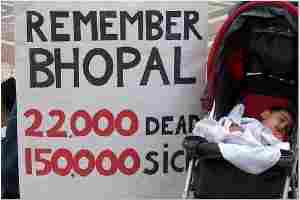PANEL MEETS TO DISCUSS GREENING THE ECONOMY 25 YEARS AFTER THE BHOPAL CHEMICAL DISASTER
On Monday, 11th May, at 6 pm in the Boston Public Library, a panel comprising of a Bhopal Chemical Disaster survivor, a long-time activist and managing trustee of the Sambhavna Clinic, Bhopal, as well as two Boston-based social justice advocates and non-profit leaders met to discuss and answer questions about the disaster and find ways to green our economy to ensure ‘No More Bhopals’ happen anywhere in the world again.
In December 1984, the city of Bhopal in Madhya Pradesh, India suffered the world’s worst industrial disaster. A chemical plant belonging to Union Carbide (now a subsidiary of Dow Chemical) released 40 tons of methyl isocyanate, a highly toxic chemical, immediately killing 4,000 people and affecting over 500,000 residents of the area. Till now, over 23,000 people have died as a result of the disaster, and thousands of Bhopalis are suffering from illnesses caused by exposure and water contamination due to the toxic waste left behind. On average, one person still dies every other day from its effects. Meanwhile, Indian authorities have failed to bring Union Carbide to account. Moreover, despite the repeated promises to clean up the toxic wastes, they remain, poisoning the land, and slowly spreading into the aquifer with every passing day.
During this panel, Safreen Khan, a 16yearold resident of Bhopal and a second-generation survivor of the disaster along with Satinath Sarangi, the managing trustee of the Sambhavna Clinic, which means ‘Possibility’ in Hindi and provides free medical care to the survivors, spoke about the ill-fated night in December 1984 when the disaster happened. Mr. Sarangi, also known as ‘Sathyu’, gave a detailed account of the night, the aftermath, as well as the lack of responsibility shown by Union Carbide following the chemical leak. From the profit-minded cost-cutting operations and the lack of a functional warning system, which severely compromised the safety of the workers and residents of the adjoining areas, to withholding information about the constituents of the chemicals leaked, which would have been used to treat victims with greater efficacy, Union Carbide’s hand in this disaster was emphasized by Sathyu. A chronological list of major events that has underlined this campaign over the last 25 years, the frustration and anger at the double standards shown by Union Carbide and the lack of adequate support from the Indian authorities, as well as the victories won over the years were also voiced.
Following that, with Sathyu as a translator, Safreen provided the audience with an account of her experience, an account that was moving, refreshing, and filled with hope for justice and for a better future. Safreen described her 500-mile ‘Padyatra’ or ‘Walk’ that she participated in along with over 50 Bhopalis that took them from Bhopal to New Delhi, the capital of India, to persuade the Prime Minister to not just talk but “Walk Your Talk.†Safreen talked about how her relatives, her friends, and her neighbors are still suffering from exposure to the chemicals, the deformities in children being born even now, the inability to perform manual labor as a result of respiratory disorders, and the contamination in their drinking water that still kills her loved ones. She ended by mentioning the manner in which the children who marched to New Delhi collected paper hearts from students in Delhi schools and colleges to give to the Prime Minister, so that he could ‘have a heart’ and honor the victims’ demands. This ultimately did lead to some of their demands being met!
The panel then moved on to discussing the ways in which the green income generation and health care organizing in Bhopal could serve as examples in making our economy green as well. Elizabeth Saunders, from the Alliance For a Healthy Tomorrow, spoke on the issue of using ‘environmentally safe’ day-to-day products ranging from all-purpose cleaners comprising of vinegar, baking soda, and water to using soap or baking soda instead of detergents. The operations of the Sambhavna Clinic, which effectively runs without the use of any toxic chemicals, echo this urgent need and the ability to prevent harmful toxins from being part of our lives. Finally, the panel discussion was rounded up by Kristin Urquiza from Corporate Accountability International, who gave an informative presentation on the fight to win the ‘tap’ back: moving away from bottled water. Through her presentation, Ms. Urquiza highlighted the growing dependence on bottled water, which besides being environmentally harmful and not much different from tap water, is also a reason for the municipality’s decreasing focus on its role in providing clean drinking water to everyone as a basic right.
This event was part of the 25th Anniversary Bhopal Survivor’s Tour, currently in progress across 21 cities in the USA and Canada and aimed at increasing public awareness, highlighting the demands that haven’t been met, and proclaiming that the fight for justice is not over even after 25 years.
